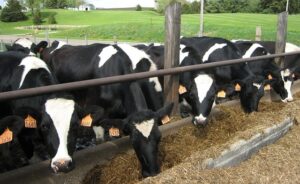Farmers encouraged to implement plan to safeguard cow performance this winter
16th December 2022
Farmers should take extra care when transitioning between different silage cuts this winter to ensure milk yield and fertility aren’t compromised.
Dr Robin Hawkey, Nutritionist at Mole Valley Farmers, said regular sampling of silage samples this winter was more important than ever because of the variability in silage samples this year.
He suggested farmers work with their nutritionists to construct a ration transition plan to safeguard animal performance.
“Farmers can’t simply switch from silage A to silage B and expect they will maintain performance. It’s essential to know the exact quality of your silage and balance it correctly.
“Many farmers are running out of first cut silage and moving on to very different second and third cuts, as well as moving onto new season maize silage. This needs careful consideration when balancing the ration,” he added.
Dr Hawkey said monitoring the intakes of cows was key. “This will give an insight into what is going on, which is particularly important in autumn block calving herds where accurate nutrition is required for the service period to maintain the calving block. Any impact on nutrition will affect fertility, which could have long-term implications for the herd,” he said.
One of Mole Valley Farmers’ clients, Duchy College, has seen exceptional performance this autumn in part thanks to the accuracy of their feeding and excellent herd management.
The farm has excelled in increasing milk protein production, with October’s costings showing both an increase in yield by 2.5 litres and an increase milk protein concentration from 3.28% to 3.34%, leading to an average increase of 3.1kg of milk protein per cow in the month.
Mole Valley Farmers’ Peter Reis explained: “This has been achieved by continual monitoring of silage quality, ration and adaptation of the farm’s bespoke blend to meet the requirements of the cows whilst in this early stage of lactation.
“We also regularly condition score cows and analyse dung for consistency, so if cows are not looking right, we will delve into more detail to find the problem before it becomes an issue. It’s all part of the service Mole Valley Farmers offers.
“It’s about keeping on top of things and not letting issues build up. We work very closely with their vet Helen Howgill from Castle Vets,” he added.
The 180-cow autumn block calving Holstein herd contains a state-of-the-art Triolet feed kitchen, feeding cows robotically six times a day using augers and a conveyor system attached to the roof.
Herd Manager Caitlin Hancock said the new system had already helped improve milk from forage due to the accuracy of the robotic feeding system, consistency of the ration and the ability to feed accurately to yield in the parlour.

